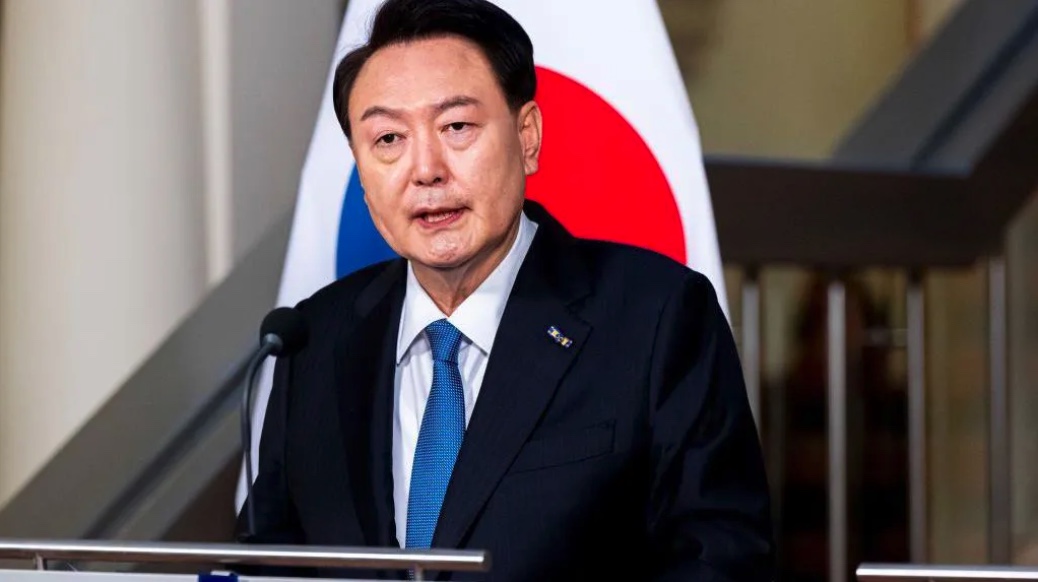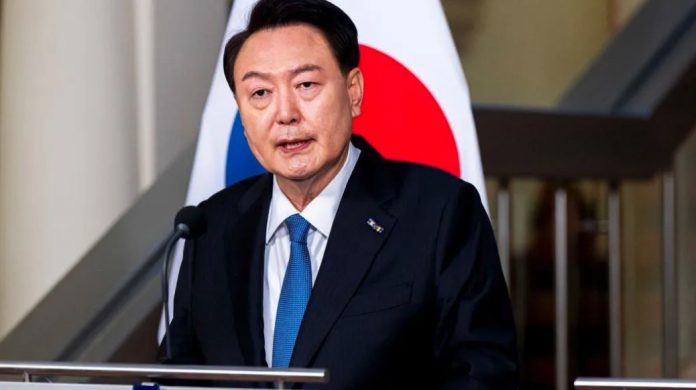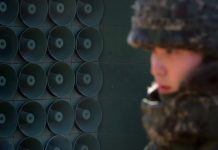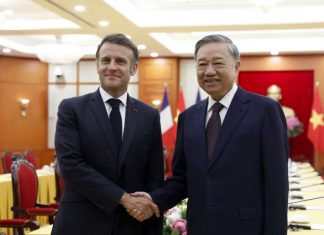หัวหน้าพรรครัฐบาลของเกาหลีใต้ เรียกร้องให้ประธานาธิบดียุน ซอกยอล “ระงับการปฏิบัติหน้าที่โดยเร็ว” โดยระบุว่าประชาชนอาจเผชิญ “อันตรายอย่างใหญ่หลวง” หากเขายังคงอยู่ในอำนาจ
ฮัน ดงฮุน หัวหน้าพรรคพลังประชาชน (PPP) เปิดเผยว่าพรรคได้รับ “หลักฐานที่น่าเชื่อถือ” ว่ายุนได้สั่งการจับกุมสมาชิกนักการเมืองสำคัญในข้อหา “ต่อต้านรัฐ” หลังจากเขาประกาศกฎอัยการศึกในคืนวันอังคาร
การกล่าวนี้เกิดขึ้นในการประชุมฉุกเฉินของพรรคเมื่อวันศุกร์ ซึ่งถือเป็นจุดเปลี่ยนจากจุดยืนก่อนหน้าของเขาที่พรรค PPP จะขัดขวางญัตติถอดถอนประธานาธิบดีซึ่งฝ่ายค้านยื่นเสนอเมื่อวันพุธ
ฝ่ายค้านต้องการเสียงสนับสนุนจาก ส.ส. พรรครัฐบาลอย่างน้อย 8 คน เพื่อให้ญัตติถอดถอนผ่านความเห็นชอบ
ยุนสร้างความตกตะลึงให้กับประเทศเมื่อคืนวันอังคาร หลังจากเขาประกาศกฎอัยการศึกโดยอ้างถึงภัยคุกคามจาก “กลุ่มต่อต้านรัฐ” และเกาหลีเหนือ
แต่ในไม่ช้าก็มีความชัดเจนว่าการตัดสินใจดังกล่าวไม่ได้เกิดจากภัยคุกคามจากภายนอก แต่เป็นปัญหาทางการเมืองภายในประเทศของเขาเอง
คำสั่งดังกล่าวถูกยกเลิกในเวลาไม่กี่ชั่วโมงหลังจากสมาชิกสภาผู้แทนราษฎร 190 คน รวมตัวกันเพื่อลงมติยับยั้ง โดยบางคนถึงกับปีนรั้วและฝ่าแนวกั้นเพื่อเข้าไปในอาคารรัฐสภา
ฮันแสดงความกังวลเมื่อวันศุกร์ว่า “การกระทำที่รุนแรง” เช่น การประกาศกฎอัยการศึก อาจเกิดขึ้นอีกหากยุนยังคงอยู่ในตำแหน่ง
“[สิ่งเหล่านี้] กำลังทำให้สาธารณรัฐเกาหลีและประชาชนต้องตกอยู่ในความเสี่ยงอย่างใหญ่หลวง” ฮันกล่าว
เขายังเสริมว่าพรรคได้ข้อมูลเกี่ยวกับแผนการควบคุมตัวนักการเมืองฝ่ายค้านในศูนย์กักกันในเมืองควาชอน ซึ่งตั้งอยู่ทางตอนใต้ของกรุงโซล
คำพูดของฮันถือเป็นสัญญาณแรกที่ชัดเจนว่าพรรคของประธานาธิบดีเองอาจลงมติร่วมกับฝ่ายค้านเพื่อถอดถอนเขา
ในขณะเดียวกัน สมาชิกสภาผู้แทนราษฎรพรรครัฐบาล โช คยองแท กลายเป็นคนแรกที่ประกาศสนับสนุนการถอดถอนประธานาธิบดีอย่างเปิดเผย
“การเลือกว่าจะยืนเคียงข้างประชาชนด้วยการระงับการปฏิบัติหน้าที่ของประธานาธิบดี หรือจะเป็นพันธมิตรกับผู้ที่ประกาศกฎอัยการศึก เป็นเรื่องที่นักการเมืองต้องตัดสินใจ” โชกล่าวเมื่อวันศุกร์
“ผมหวังว่านักการเมืองในพรรคพลังประชาชนทุกคนจะยืนอยู่ข้างประชาชน” เขากล่าวเสริม
ในกรุงโซล มีการประท้วงบนท้องถนนต่อเนื่องมากว่าสองวันเพื่อเรียกร้องให้ยุนลาออก ขณะที่ตำรวจระบุว่าเขากำลังถูกสอบสวนในข้อหา “ก่อกบฏ”
นอกจากนี้ ประชาชนยังส่งข้อความไปยังสมาชิกสภาผู้แทนราษฎรพรรครัฐบาล PPP เพื่อกดดันให้พวกเขาลงมติถอดถอนยุน โดยรายงานจากสื่อเกาหลีใต้ระบุว่าสมาชิกสภาบางคน เช่น ชิน ซองบอม ได้รับข้อความมากกว่า 4,000 ข้อความบนเฟซบุ๊ก
จากผลสำรวจของ Realmeter เมื่อวันพฤหัสบดี พบว่าชาวเกาหลีใต้กว่า 70% สนับสนุนการถอดถอนประธานาธิบดี
ญัตติถอดถอนต้องการคะแนนเสียง 200 เสียงเพื่อผ่านความเห็นชอบ โดยฝ่ายค้านมี 192 ที่นั่ง และต้องการเสียงสนับสนุนจาก ส.ส. พรรครัฐบาล 108 คนอีกอย่างน้อย 8 คน
ก่อนที่ยุนจะพยายามประกาศกฎอัยการศึก เขาต้องเผชิญกับคะแนนนิยมที่ลดลงอย่างต่อเนื่อง ข้อกล่าวหาเรื่องคอร์รัปชัน และสภานิติบัญญัติที่ฝ่ายค้านครองเสียงข้างมาก ซึ่งทำให้เขาแทบไม่มีอำนาจในฐานะผู้นำประเทศ
South Koreans face danger if Yoon stays – ruling party chief

South Korea’s ruling party chief has called for President Yoon Suk Yeol to “suspend his duties soon”, saying that citizens could be in “great danger” if he remained in power.
Han Dong-hoon, the leader of the People Power Party (PPP), added that his party had received “credible evidence” that Yoon had ordered the arrest of key politicians on “anti-state charges” when he declared martial law on Tuesday night.
His comments, made at an emergency party meeting on Friday, are a departure from his earlier stand that his party would block the opposition’s impeachment motion, which was tabled on Wednesday.
The opposition needs at least eight ruling party MPs to back the impeachment motion for it to succeed.
Yoon shocked the country on Tuesday night when he declared emergency martial law, citing threats from “anti-state forces” and North Korea.
But it soon became clear that his move had been spurred not by external threats but by his own domestic political troubles.
The order was abruptly reversed hours later after 190 MPs managed to make it into the parliament and vote it down – some of them climbing fences and breaking barricades to get into the chamber.
Han on Friday expressed concerns that “extreme actions”, such as the martial law declaration, could be repeated if Yoon remained in office.
“[These are] putting the Republic of Korea and its people at great risk,” he said.
He added that his party had learnt about plans to jail arrested opposition politicians in a detention centre in Gwacheon, a city south of Seoul.
His comments are the first clear indication that the president’s own party may now vote with the opposition to help impeach him.
Opposition lawmakers are concerned that there will be another attempt to impose martial law. Some of them earlier told BBC they have been staying close to the National Assembly grounds so they could get there quickly to vote down any such declaration.
Meanwhile, ruling party MP Cho Kyung-tae became the first ruling party MP to publicly voice support for Yoon’s impeachment.
“The choice between standing on the side of the people by suspending the president’s duties or becoming an ally of the forces that imposed martial law is a matter for politicians to judge,” Cho said on Friday.
“I hope that all the politicians of the People’s Power will stand on the side of the people,” he added.
The capital, Seoul, has seen more than two days of street protests demanding Yoon’s resignation, while police said he is being investigated for “insurrection”.
People have also been flooding PPP lawmakers with text messages, urging them to vote for Yoon’s impeachment, according to South Korean media reports.
One MP, Shin Sung-bum, received more than 4,000 such messages on Facebook, The Chosun Daily reported.
More than seven out of 10 South Koreans were in favour of the impeachment, a survey by local pollster Realmeter showed on Thursday.
The impeachment motion needs 200 votes to pass. The opposition have 192 seats and would need at least eight of the 108 ruling party MPs to back their motion for it to pass.
Before his attempt to place the country under military rule, Yoon had been beset by low popularity ratings, corruption allegations and an opposition-led legislature that reduced him to a lame-duck leader.
By Kelly Ng and Laura Bicker, BBC News

















